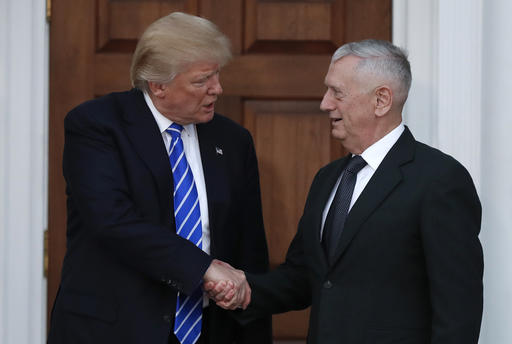
In this Nov. 19, 2016, file photo, President-elect Donald Trump shakes hands with retired Marine Corps Gen. James Mattis as he leaves Trump National Golf Club Bedminster clubhouse in Bedminster, N.J. Trump said at a rally on Dec. 1, that he will nominate Mattis as defense secretary. AP FILE PHOTO
CINCINNATI, United States—President-elect Donald Trump said Thursday that he will nominate US Marine retired general James Mattis, who oversaw US war efforts in the Middle East, to be his defense secretary.
“We are going to appoint ‘Mad Dog’ Mattis as our secretary of defense,” Trump told a large crowd in Cincinnati, Ohio, referring by nickname to the tough-talking general who headed the US Central Command, giving him authority over troops in Iraq and Afghanistan.
“He’s our best. They say he’s the closest thing to (World War II-era) general George Patton that we have,” Trump said, apparently divulging his pick days ahead of schedule as his transition team had already said there would be no more cabinet announcements this week.
“Okay. So I gave up a little secret. My people over there are probably saying, ‘You weren’t supposed to do that, Mr. Trump,'” the president-elect quipped.
READ: Trump drama rolls on: Disputes, falsehoods hit transition
Mattis, who is 66, commanded a Marine battalion during the First Gulf War and a Marine division during the 2003 invasion of Iraq. In 2010, the tough-talking native of Washington state was named to head the US Central Command.
That gave him authority over troops in Iraq, where he helped develop a counterinsurgency approach before overseeing the US withdrawal, and Afghanistan, where he implemented a troop surge. It also gave him responsibility for an area including Syria, Yemen and Iran.
Previously, he led the US Joint Forces Command and a NATO command charged with preparing the alliance’s forces to meet future challenges.
A colorful commander, he earned the nickname “Mad Dog” with his battle-hardened swagger and the sort of blunt language marines are famous for. He has been quoted as saying, “Be polite, be professional, but have a plan to kill everyone you meet.”
But to serve as defense secretary, Mattis would need Senate confirmation — and a waiver of a law that bans uniformed military officers from serving in that post for seven years after leaving active duty.
The law is intended to ensure the bedrock notion of civilian control of the nation’s military./rga